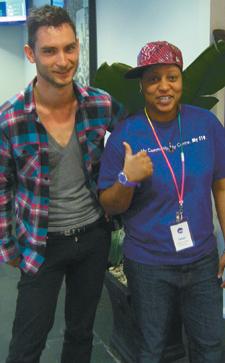It’s always a struggle for non-profit service organizations to recruit the volunteers they need, but the 519 Church Street Community Centre is in the somewhat enviable position of not only getting more applicants than they require but also winning one of Volunteer Toronto’s first-ever Legacy Awards earlier this month. Scott Clarke, volunteer development officer at The 519, received the award but is quick to deflect any personal glory.
“It’s an organizational award,” the 30-year-old Milton-born manager insists. “So much of my job is working with all of the staff here to place volunteers…There’s no way I could do it all myself.” Plus, he says, The 519 was one of three Community Building Award-winners, along with the Centre for Addiction and Mental Health and the Toronto Cross-Cultural Community Services Association.
All true, but Jessica Reynolds, director of communications at Volunteer Toronto, says Clarke and his team won out for having “pioneered a new model of engaging volunteers from diverse cultural backgrounds.” The 519 has worked to place its variety of volunteers in leadership positions. In a press release she writes, “The 519 model of volunteer-lead programming is an exceptional example of community-first practice.”
Again, Clarke downplays the praise.
“Getting people with similar experiences assisting each other is really the goal of a lot of our volunteer programs,” he says.
Like most community organizations, The 519 has a small and overworked staff, so enabling volunteers to have more autonomy just makes sense.
“It’s about building up leaders in our community,” says Clarke, adding it’s simply an extension of what The 519 has always done.
“Our programs use volunteers from the communities we’re trying to reach out to,” he says. “They do much more than just perform a task; they use their personal experiences.” For anyone coming into The 519, Clarke says, “we have such a cross-section of the queer community and downtown community, it’s exciting for people to meet different people who have different experiences and to find those areas of commonality.” While the majority of the roughly 400 regular, active volunteers are from the gay, bisexual and trans communities, he notes, “Not all of our programs are focused on doing work in those communities. They’re open to everyone.”
Before his two-and-a-half-year stint as a manager, Clarke was a 519 volunteer himself with the Sunday drop-in program for the homeless.
“It’s a core program here, and it really gave me an understanding of the centre and the community around it,” he says. “It was interesting getting to know Church St through its homeless people.”
Clarke came to Toronto after a longer-than-usual stint at the University of Guelph, where, he says, “It took me seven years to do my undergraduate degree because I was always being involved in political organizing or social work activities, student radio, student magazines, always in the human rights office.”
“They know it’s important to me, so they’ve got used to it,” he says, “but people don’t often see where it leads. Countless hours of unpaid work that I felt passionate about resulted in the work being good and a trajectory that led me here. I don’t have a diploma in volunteer management, but I have a dozen years’ experience in community organizing and connections that have benefited the centre.” As a longtime social justice activist and community organizer, Clarke says, “I bring a lot of that grassroots approach to this work — that it’s more about community building around common issues and causes.”
The 519 gets about 30 new volunteer applications each month, and Clarke’s job is to find a role for them, though not necessarily right away. “I’d rather hold off on placing a volunteer for four or five months than to place them and have them not feel supported or lose interest and not come back,” he says.
It’s a tricky balance between the needs of the organization and the needs of the volunteers. Clarke jokes that it’s a lot like speed-dating: “I have to ask questions and get a sense of what they want to do and what their skills are relatively quickly. People aren’t often aware of what they can offer. Creating a fulfilling volunteer experience for someone means quickly getting a sense of what they’re looking to get out of it. Some want experience that will lead to a job, some want community experience, some want to make friends. It’s different for everyone.”?
They all, however, seem to agree on the centre’s adorable new purple T-shirts. “Within their first week of volunteering,” Clarke says, “people ask, ‘When do I get my T-shirt?’ Even the positions that don’t need the T-shirt, the volunteers often want one anyway.” He reveals plans for more colours for Pride as the centre begins to recruit for the big weekend.
“We need about 350 volunteers,” Clarke says, “but it’s really fun and there’s a range of things to do. People like volunteering with us because it’s a relatively small team and people get to know each other.” Again, he says, volunteers are kept happy by being shown “how their small piece fits into the bigger picture of the work we do. Pride is our largest fundraising event of the year, and even selling tickets or slugging beer cases will support the work we do for the rest of the year.”
Clarke’s enthusiasm is infectious as he preaches the gospel of volunteerism: “We live in a culture than can be alienating, where people feel alone and failing, and volunteering changes that by bringing people together. We have people with full-time jobs and are raising kids who still come in and volunteer one day a week. They want to see people and feel a connection to their community.” As his own career has grown at The 519, he says, “?The dynamic volunteers here have taught me so much and a lot of the direction of the program I’ve gone in is the result of their suggestions.”
Winning in the inaugural year of the Volunteer Toronto awards, Clarke says, “meant a lot to our team” and, he finally admits, to himself as well. “It is nice to be recognized,” he says, laughing at how he now has an esteemed prize to show his parents. “See? Going to those protests paid off, Mom!”?


 Why you can trust Xtra
Why you can trust Xtra


